Units 7-8 核心考点课件(共27张PPT)
文档属性
| 名称 | Units 7-8 核心考点课件(共27张PPT) |
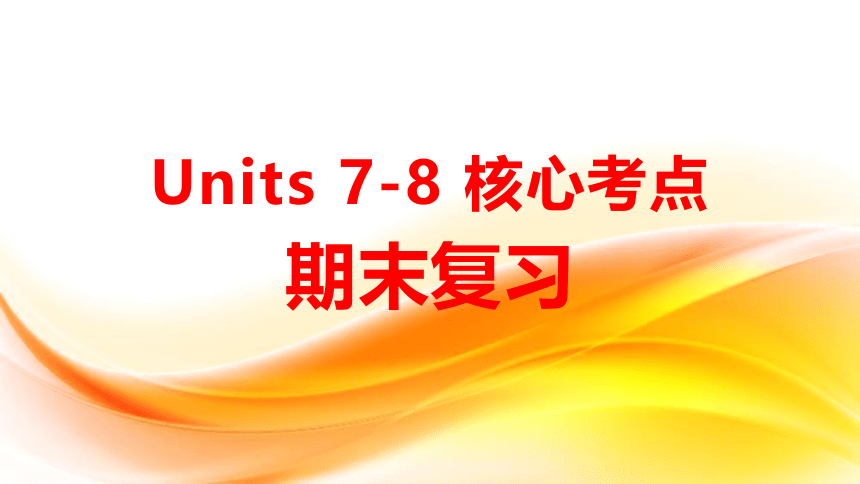
|
|
| 格式 | pptx | ||
| 文件大小 | 397.0KB | ||
| 资源类型 | 教案 | ||
| 版本资源 | 仁爱科普版 | ||
| 科目 | 英语 | ||
| 更新时间 | 2022-05-24 00:00:00 | ||
图片预览

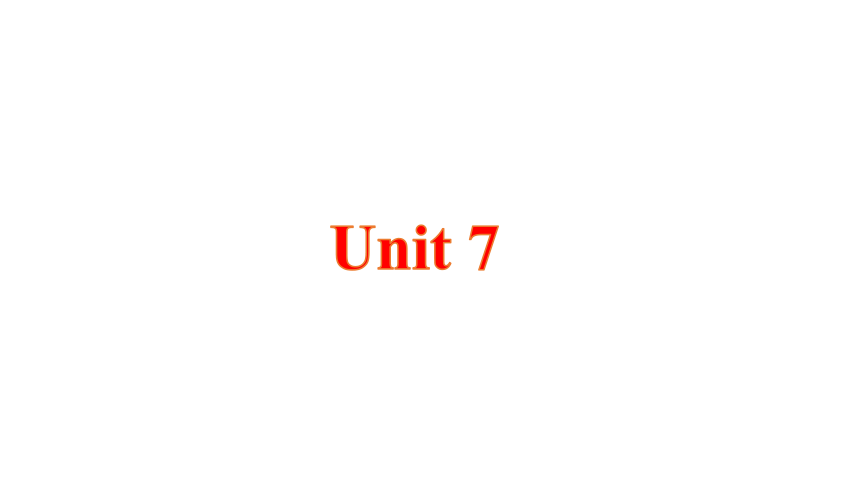
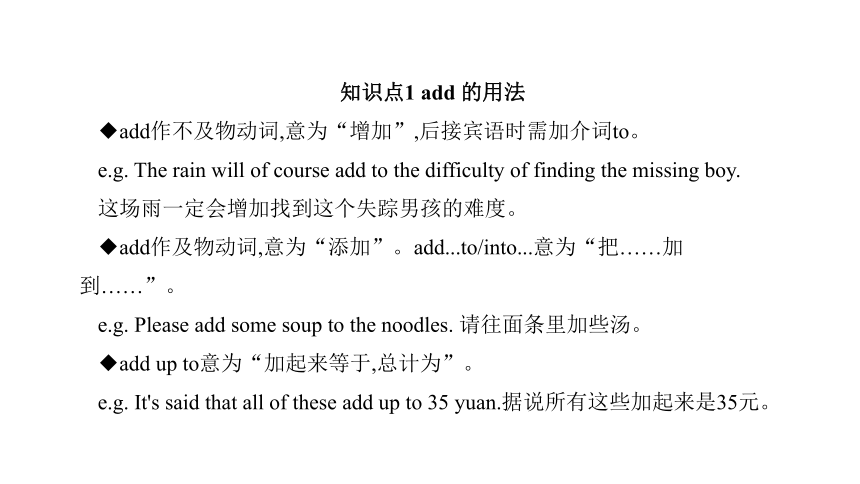
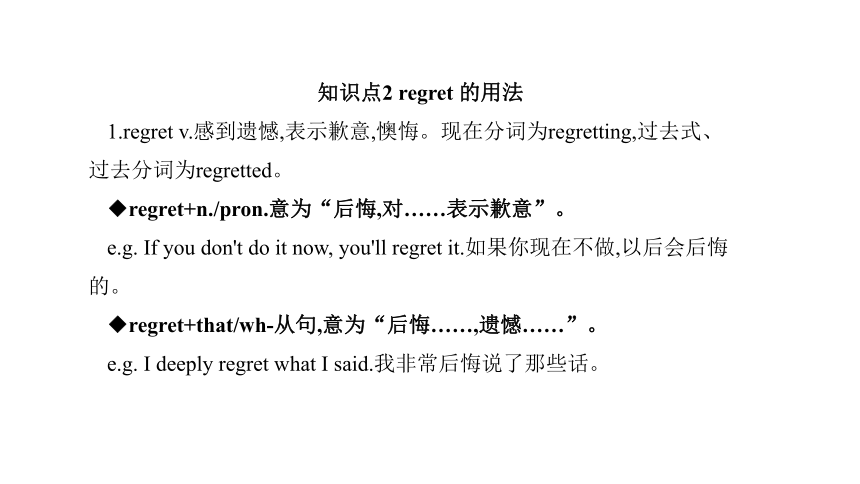
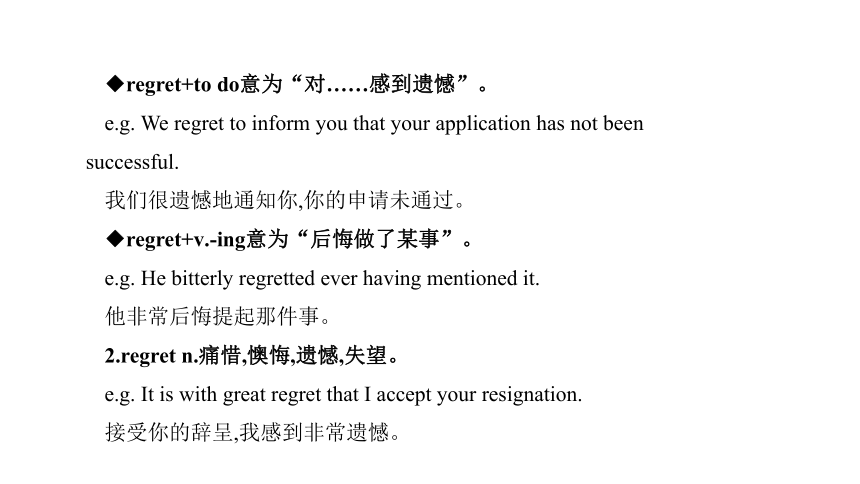
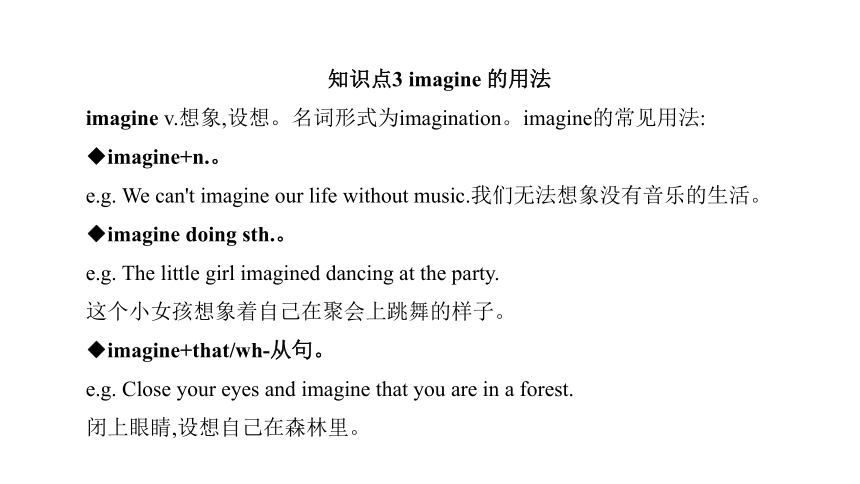
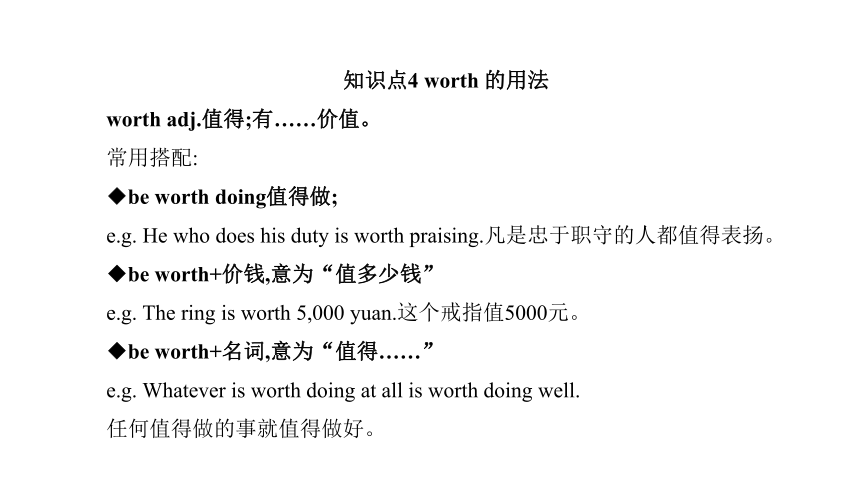
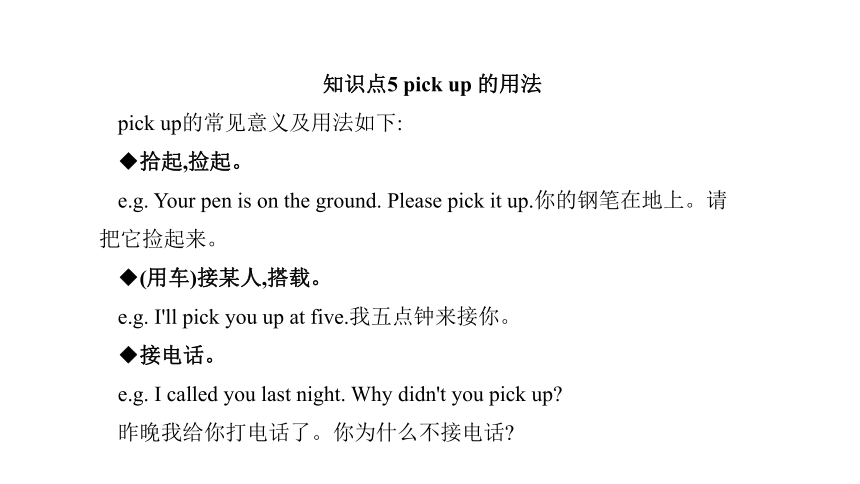
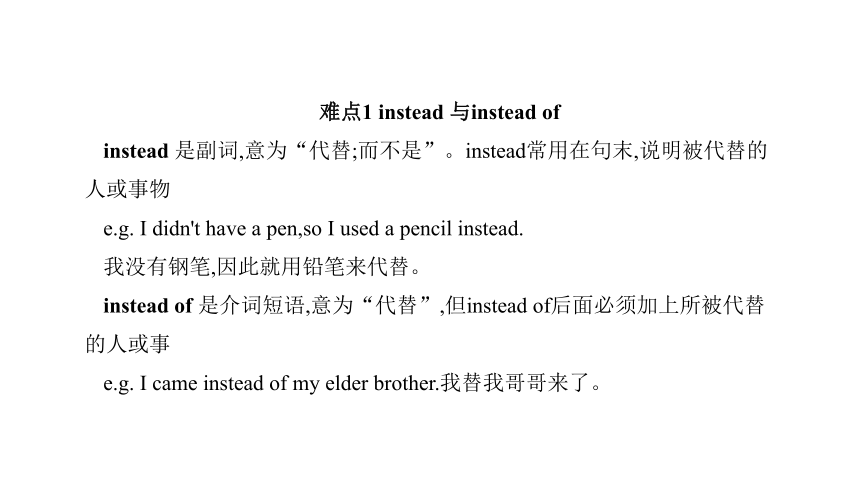
文档简介
(共27张PPT)
期末复习
Units 7-8 核心考点
Unit 7
知识点1 add 的用法
◆add作不及物动词,意为“增加”,后接宾语时需加介词to。
e.g. The rain will of course add to the difficulty of finding the missing boy.
这场雨一定会增加找到这个失踪男孩的难度。
◆add作及物动词,意为“添加”。add...to/into...意为“把……加到……”。
e.g. Please add some soup to the noodles. 请往面条里加些汤。
◆add up to意为“加起来等于,总计为”。
e.g. It's said that all of these add up to 35 yuan.据说所有这些加起来是35元。
知识点2 regret 的用法
1.regret v.感到遗憾,表示歉意,懊悔。现在分词为regretting,过去式、过去分词为regretted。
◆regret+n./pron.意为“后悔,对……表示歉意”。
e.g. If you don't do it now, you'll regret it.如果你现在不做,以后会后悔的。
◆regret+that/wh-从句,意为“后悔……,遗憾……”。
e.g. I deeply regret what I said.我非常后悔说了那些话。
◆regret+to do意为“对……感到遗憾”。
e.g. We regret to inform you that your application has not been successful.
我们很遗憾地通知你,你的申请未通过。
◆regret+v.-ing意为“后悔做了某事”。
e.g. He bitterly regretted ever having mentioned it.
他非常后悔提起那件事。
2.regret n.痛惜,懊悔,遗憾,失望。
e.g. It is with great regret that I accept your resignation.
接受你的辞呈,我感到非常遗憾。
知识点3 imagine 的用法
imagine v.想象,设想。名词形式为imagination。imagine的常见用法:
◆imagine+n.。
e.g. We can't imagine our life without music.我们无法想象没有音乐的生活。
◆imagine doing sth.。
e.g. The little girl imagined dancing at the party.
这个小女孩想象着自己在聚会上跳舞的样子。
◆imagine+that/wh-从句。
e.g. Close your eyes and imagine that you are in a forest.
闭上眼睛,设想自己在森林里。
知识点4 worth 的用法
worth adj.值得;有……价值。
常用搭配:
◆be worth doing值得做;
e.g. He who does his duty is worth praising.凡是忠于职守的人都值得表扬。
◆be worth+价钱,意为“值多少钱”
e.g. The ring is worth 5,000 yuan.这个戒指值5000元。
◆be worth+名词,意为“值得……”
e.g. Whatever is worth doing at all is worth doing well.
任何值得做的事就值得做好。
知识点5 pick up 的用法
pick up的常见意义及用法如下:
◆拾起,捡起。
e.g. Your pen is on the ground. Please pick it up.你的钢笔在地上。请把它捡起来。
◆(用车)接某人,搭载。
e.g. I'll pick you up at five.我五点钟来接你。
◆接电话。
e.g. I called you last night. Why didn't you pick up
昨晚我给你打电话了。你为什么不接电话
难点1 instead 与instead of
instead 是副词,意为“代替;而不是”。instead常用在句末,说明被代替的人或事物
e.g. I didn't have a pen,so I used a pencil instead.
我没有钢笔,因此就用铅笔来代替。
instead of 是介词短语,意为“代替”,但instead of后面必须加上所被代替的人或事
e.g. I came instead of my elder brother.我替我哥哥来了。
难点2 achieve, come true 与realize
achieve , realize与come true都意为“实现”
achieve: sb.+achieve+梦想/目标
e.g. He achieved his goal by peaceful means.
他通过和平的方法实现了自己的目标。
realize: realize one's dream实现某人的梦想
e.g. The girl finally realized her dream of becoming an actress.
那个女孩终于实现了当演员的梦想。
come true: 梦想/目标+come true
e.g. Whatever you do, just don't give up and your dream will come true.
无论做什么,只有不放弃,你的梦想才会实现。
知识拓展
1.realize还有“理解;领会;认识到;意识到”的含义。
“实现梦想”也可以用realize one's dream。
2.achieve one's dream“实现某人的梦想”,等同于make one's dream come true。
e.g. I hope you can achieve your dream.
=I hope you can make your dream come true.
我希望你能实现你的梦想。
Unit 8
知识点1 感官类系动词
很多感官动词都可以作系动词,如look(看起来),smell(闻起来),taste(尝起来),feel(摸起来),其后接形容词构成系表结构。
e.g. Silk feels soft.丝绸摸起来很软。
How beautiful these flowers look!这些花看起来真漂亮!
The food my mother cooked yesterday tasted delicious.
我妈妈昨天做的饭菜真好吃。
Song Zuying's songs sound beautiful.宋祖英的歌很好听。
知识点2 afford 的用法
afford 意为“付(花)得起、负担得起”,通常与情态动词can, could或be able to连用,后接不定式、名词或代词。
e.g. I can't afford(to buy)a new coat.我没钱买件新外套。
He can't afford the time for it. 他抽不出时间来做此事。
afford意为“提供,给予”时,其后可以接双宾语。
e.g. His visit affords us great pleasure.
他的来访给我们带来极大的荣幸。
知识点3 succeed 的用法
succeed常用结构:succeed in doing sth.成功做某事。
e.g. In the end, they succeeded in climbing the top of the mountain.
最后,他们成功地登上了山顶。
succeed名词形式:success成功;形容词形式:successful成功的;副词形式:successfully成功地。
知识点4 own 的用法
1.own作形容词,意为“自己的;本人的”,常和名词所有格或形容词性物主代词连用,以加强语气,即one's own,意为“某人自己的”。
e.g. He worked hard for two years and had his own car at last.
他努力工作了两年,终于有了自己的汽车。
2.own还可作动词,表示“拥有;有”,相当于have。名词形式为owner,意为“主人”。
e.g. Do you own the house 这幢房子归你所有吗
The handbag has been returned to the owner.那个手提包已经物归原主了。
词汇拓展
一句巧记 I own a bike. I am the owner of the bike.
我拥有一辆自行车,我是自行车的主人。
辨析 own与have
own与have二者作动词时,均表示“有”的意思。
own用于较正式的场合,强调“(合法地)拥有”某物的所有权,主语是该物的主人。
e.g. I own a bike.我有一辆自行车。(说明这辆自行车属于我所有,我是它的主人。)
have的用法比own较通俗一些,强调某人与某物存在所有关系。有时此人不一定是该物的主人。
e.g. I have an English book. 我有本英语书。
知识点5 similar 的用法
1.be similar to sb./sth.与某人或某物相似。
e.g. My teaching style is similar to that of most other teachers.
我的教学风格和多数教师的(教学风格)相似。
2.be similar in sth.在某方面相似。
e.g. The two houses are similar in size.两座房子大小差不多。
辨析 be similar to, look like与take after
be similar to一般用在相似的物品或情景的对比上。
look like多指视觉上的相似,既可指人也可指物,只是外表看上去像。
take after多用在有血缘关系的亲子之间,多用来指外貌,另外也可以用在性格、脾气这些内在特质上。
知识点6 stop 的用法
难点1 except, besides, but 与except for
except 除……之外,把……排除在外(不再有)强调被排除的部分不包括在内,用作介词
e.g. The window is never opened except in summer.
除夏天外,这扇窗户从不打开。
besides 除……之外(另外还有) 强调被排除的部分也包括在内,用作介词
e.g. Mary knows Japanese besides French.
除法语外, 玛丽还懂日语。
but 除了……之外,什么也没有 but后的词是仅有或存在的内容,与except同义,通常用于all, every, nothing等词后,用作介词
e.g. Nobody knew her name but me.除我之外, 没人知道她的名字。
except for 除……之外 指排除不同类的东西
e.g. The movie was good except for the ending.
这部电影除了结尾之外都很好。
难点2 so...that , so that 与too...to
so...that...引导的是结果状语从句,表示“如此……以至于……”。
e.g. I'm so busy that I have no time to go shopping.
我如此忙以至于没有时间去购物。
The poor man was so hungry that he ate up all the food on the plate.
这个穷人如此饿,以至于将盘子里所有的食物都吃光了。
so...that...引导的否定句和too...to...结构可以互换。
e.g. The woman was so weak that she couldn't stand up.
=The woman was too weak to stand up.
这位妇女身体太虚弱了,以至于站不起来。
so...that...引导的肯定句可以和...enough to...结构互换。
e.g. The film was so interesting that I saw it again and again.
=The film was interesting enough for me to see again and again.
这部影片如此有趣,以至于我看了一遍又一遍。
拓展
such+a/an+形容词+名词单数=so+形容词+a/an+名词单数,后也可跟that从句。
e.g. This is such a wonderful film that I want to see it again.
=This is so wonderful a film that I want to see it again.
这部电影太精彩了,我想再看一遍。
so that意为“以便,为了”,引导目的状语从句,可与in order that互换。
e.g. He got up early so that he could catch the early bus.
=He got up early in order that he could catch the early bus.
他早早地起床以便能够赶上早班车。
too...to...意为“太……以至于不能……”。too后接形容词或副词原级。
e.g. He is too young to join the army.他年龄太小,不能参军。
Bye Bye!
期末复习
Units 7-8 核心考点
Unit 7
知识点1 add 的用法
◆add作不及物动词,意为“增加”,后接宾语时需加介词to。
e.g. The rain will of course add to the difficulty of finding the missing boy.
这场雨一定会增加找到这个失踪男孩的难度。
◆add作及物动词,意为“添加”。add...to/into...意为“把……加到……”。
e.g. Please add some soup to the noodles. 请往面条里加些汤。
◆add up to意为“加起来等于,总计为”。
e.g. It's said that all of these add up to 35 yuan.据说所有这些加起来是35元。
知识点2 regret 的用法
1.regret v.感到遗憾,表示歉意,懊悔。现在分词为regretting,过去式、过去分词为regretted。
◆regret+n./pron.意为“后悔,对……表示歉意”。
e.g. If you don't do it now, you'll regret it.如果你现在不做,以后会后悔的。
◆regret+that/wh-从句,意为“后悔……,遗憾……”。
e.g. I deeply regret what I said.我非常后悔说了那些话。
◆regret+to do意为“对……感到遗憾”。
e.g. We regret to inform you that your application has not been successful.
我们很遗憾地通知你,你的申请未通过。
◆regret+v.-ing意为“后悔做了某事”。
e.g. He bitterly regretted ever having mentioned it.
他非常后悔提起那件事。
2.regret n.痛惜,懊悔,遗憾,失望。
e.g. It is with great regret that I accept your resignation.
接受你的辞呈,我感到非常遗憾。
知识点3 imagine 的用法
imagine v.想象,设想。名词形式为imagination。imagine的常见用法:
◆imagine+n.。
e.g. We can't imagine our life without music.我们无法想象没有音乐的生活。
◆imagine doing sth.。
e.g. The little girl imagined dancing at the party.
这个小女孩想象着自己在聚会上跳舞的样子。
◆imagine+that/wh-从句。
e.g. Close your eyes and imagine that you are in a forest.
闭上眼睛,设想自己在森林里。
知识点4 worth 的用法
worth adj.值得;有……价值。
常用搭配:
◆be worth doing值得做;
e.g. He who does his duty is worth praising.凡是忠于职守的人都值得表扬。
◆be worth+价钱,意为“值多少钱”
e.g. The ring is worth 5,000 yuan.这个戒指值5000元。
◆be worth+名词,意为“值得……”
e.g. Whatever is worth doing at all is worth doing well.
任何值得做的事就值得做好。
知识点5 pick up 的用法
pick up的常见意义及用法如下:
◆拾起,捡起。
e.g. Your pen is on the ground. Please pick it up.你的钢笔在地上。请把它捡起来。
◆(用车)接某人,搭载。
e.g. I'll pick you up at five.我五点钟来接你。
◆接电话。
e.g. I called you last night. Why didn't you pick up
昨晚我给你打电话了。你为什么不接电话
难点1 instead 与instead of
instead 是副词,意为“代替;而不是”。instead常用在句末,说明被代替的人或事物
e.g. I didn't have a pen,so I used a pencil instead.
我没有钢笔,因此就用铅笔来代替。
instead of 是介词短语,意为“代替”,但instead of后面必须加上所被代替的人或事
e.g. I came instead of my elder brother.我替我哥哥来了。
难点2 achieve, come true 与realize
achieve , realize与come true都意为“实现”
achieve: sb.+achieve+梦想/目标
e.g. He achieved his goal by peaceful means.
他通过和平的方法实现了自己的目标。
realize: realize one's dream实现某人的梦想
e.g. The girl finally realized her dream of becoming an actress.
那个女孩终于实现了当演员的梦想。
come true: 梦想/目标+come true
e.g. Whatever you do, just don't give up and your dream will come true.
无论做什么,只有不放弃,你的梦想才会实现。
知识拓展
1.realize还有“理解;领会;认识到;意识到”的含义。
“实现梦想”也可以用realize one's dream。
2.achieve one's dream“实现某人的梦想”,等同于make one's dream come true。
e.g. I hope you can achieve your dream.
=I hope you can make your dream come true.
我希望你能实现你的梦想。
Unit 8
知识点1 感官类系动词
很多感官动词都可以作系动词,如look(看起来),smell(闻起来),taste(尝起来),feel(摸起来),其后接形容词构成系表结构。
e.g. Silk feels soft.丝绸摸起来很软。
How beautiful these flowers look!这些花看起来真漂亮!
The food my mother cooked yesterday tasted delicious.
我妈妈昨天做的饭菜真好吃。
Song Zuying's songs sound beautiful.宋祖英的歌很好听。
知识点2 afford 的用法
afford 意为“付(花)得起、负担得起”,通常与情态动词can, could或be able to连用,后接不定式、名词或代词。
e.g. I can't afford(to buy)a new coat.我没钱买件新外套。
He can't afford the time for it. 他抽不出时间来做此事。
afford意为“提供,给予”时,其后可以接双宾语。
e.g. His visit affords us great pleasure.
他的来访给我们带来极大的荣幸。
知识点3 succeed 的用法
succeed常用结构:succeed in doing sth.成功做某事。
e.g. In the end, they succeeded in climbing the top of the mountain.
最后,他们成功地登上了山顶。
succeed名词形式:success成功;形容词形式:successful成功的;副词形式:successfully成功地。
知识点4 own 的用法
1.own作形容词,意为“自己的;本人的”,常和名词所有格或形容词性物主代词连用,以加强语气,即one's own,意为“某人自己的”。
e.g. He worked hard for two years and had his own car at last.
他努力工作了两年,终于有了自己的汽车。
2.own还可作动词,表示“拥有;有”,相当于have。名词形式为owner,意为“主人”。
e.g. Do you own the house 这幢房子归你所有吗
The handbag has been returned to the owner.那个手提包已经物归原主了。
词汇拓展
一句巧记 I own a bike. I am the owner of the bike.
我拥有一辆自行车,我是自行车的主人。
辨析 own与have
own与have二者作动词时,均表示“有”的意思。
own用于较正式的场合,强调“(合法地)拥有”某物的所有权,主语是该物的主人。
e.g. I own a bike.我有一辆自行车。(说明这辆自行车属于我所有,我是它的主人。)
have的用法比own较通俗一些,强调某人与某物存在所有关系。有时此人不一定是该物的主人。
e.g. I have an English book. 我有本英语书。
知识点5 similar 的用法
1.be similar to sb./sth.与某人或某物相似。
e.g. My teaching style is similar to that of most other teachers.
我的教学风格和多数教师的(教学风格)相似。
2.be similar in sth.在某方面相似。
e.g. The two houses are similar in size.两座房子大小差不多。
辨析 be similar to, look like与take after
be similar to一般用在相似的物品或情景的对比上。
look like多指视觉上的相似,既可指人也可指物,只是外表看上去像。
take after多用在有血缘关系的亲子之间,多用来指外貌,另外也可以用在性格、脾气这些内在特质上。
知识点6 stop 的用法
难点1 except, besides, but 与except for
except 除……之外,把……排除在外(不再有)强调被排除的部分不包括在内,用作介词
e.g. The window is never opened except in summer.
除夏天外,这扇窗户从不打开。
besides 除……之外(另外还有) 强调被排除的部分也包括在内,用作介词
e.g. Mary knows Japanese besides French.
除法语外, 玛丽还懂日语。
but 除了……之外,什么也没有 but后的词是仅有或存在的内容,与except同义,通常用于all, every, nothing等词后,用作介词
e.g. Nobody knew her name but me.除我之外, 没人知道她的名字。
except for 除……之外 指排除不同类的东西
e.g. The movie was good except for the ending.
这部电影除了结尾之外都很好。
难点2 so...that , so that 与too...to
so...that...引导的是结果状语从句,表示“如此……以至于……”。
e.g. I'm so busy that I have no time to go shopping.
我如此忙以至于没有时间去购物。
The poor man was so hungry that he ate up all the food on the plate.
这个穷人如此饿,以至于将盘子里所有的食物都吃光了。
so...that...引导的否定句和too...to...结构可以互换。
e.g. The woman was so weak that she couldn't stand up.
=The woman was too weak to stand up.
这位妇女身体太虚弱了,以至于站不起来。
so...that...引导的肯定句可以和...enough to...结构互换。
e.g. The film was so interesting that I saw it again and again.
=The film was interesting enough for me to see again and again.
这部影片如此有趣,以至于我看了一遍又一遍。
拓展
such+a/an+形容词+名词单数=so+形容词+a/an+名词单数,后也可跟that从句。
e.g. This is such a wonderful film that I want to see it again.
=This is so wonderful a film that I want to see it again.
这部电影太精彩了,我想再看一遍。
so that意为“以便,为了”,引导目的状语从句,可与in order that互换。
e.g. He got up early so that he could catch the early bus.
=He got up early in order that he could catch the early bus.
他早早地起床以便能够赶上早班车。
too...to...意为“太……以至于不能……”。too后接形容词或副词原级。
e.g. He is too young to join the army.他年龄太小,不能参军。
Bye Bye!
同课章节目录
- Unit 5 Feeling excited
- Topic 1 You look excited
- Topic 2 I’m feeling better now.
- Topic 3 Many things can affect our feelings.
- Unit 6 Enjoying Cycling
- Topic 1 We're going on a three-day visit to Mount
- Topic 2 How about exploring Tian’anmen Square?
- Topic 3 Bicycle riding is good exercise.
- Unit 7 Food festival
- Topic 1 We’re preparing for a food festival.
- Topic 2 I’m not sure whether I can cook it well.
- Topic 3 I Cooked the Most Successfully
- Unit 8 Our Clothes
- Topic 1 We will have a class fashion show.
- Topic 2 We can design our own uniforms.
- Topic 3 He said the fashion show was wonderful.
